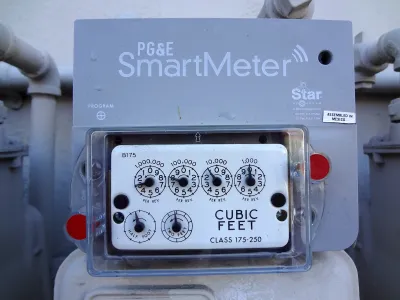A movement to switch to electric appliances at the neighborhood scale is taking off in California.

A group of California neighbors is working to eliminate gas-powered appliances, which create harmful air pollution inside homes. The group, the Alliance of Californians for Community Empowerment (ACCE) Action, formed after residents found out about the risks to public health created by indoor gas appliances.
As Twilight Greenaway explains in Inside Climate News, the movement for “neighborhood-scale” or zonal decarbonization seeks to eliminate gas lines in favor of electrifying homes. The idea has support from Pacific Gas & Electric, a Northern California utility, which says it is willing to “spend a portion of the money it would otherwise use to maintain gas lines to help electrify the homes in the neighborhood that will no longer use the gas.”
The group is working with PG&E to identify areas appropriate for decarbonization. “Once the group chooses an area, it plans to run a pilot project with the goal of electrifying all the appliances and adding solar panels and batteries for up to 80 homes.”
Electrifying neighborhoods at a larger scale “just makes more sense than a piecemeal approach in many parts of the state.” A new California law, SB 1221, enables neighborhood-scale decarbonization projects if 67 percent or more of neighbors agree.
Supporting lower-income residents who may not be able to afford electric appliances is important, Greenaway notes. According to Michelle Plouse, community development analyst for Albany, California, “What will happen if we don’t decommission the gas line is that the cost of maintaining it will continue to increase over time, and the user base will drop as people electrify.”
FULL STORY: In California, a Push to Decommission Gas Lines in Low-Income Neighborhoods Moves Forward

Planetizen Federal Action Tracker
A weekly monitor of how Trump’s orders and actions are impacting planners and planning in America.

Vehicle-related Deaths Drop 29% in Richmond, VA
The seventh year of the city's Vision Zero strategy also cut the number of people killed in alcohol-related crashes by half.

As Trump Phases Out FEMA, Is It Time to Flee the Floodplains?
With less federal funding available for disaster relief efforts, the need to relocate at-risk communities is more urgent than ever.

More Apartments Are Being Built in Less-Dense Areas
Rising housing costs in urban cores and a demand for rental housing is driving more multifamily development to exurbs and small metros.

Plastic Bag Bans Actually Worked
U.S. coastal areas with plastic bag bans or fees saw significant reductions in plastic bag pollution — but plastic waste as a whole is growing.

Improving Indoor Air Quality, One Block at a Time
A movement to switch to electric appliances at the neighborhood scale is taking off in California.
Urban Design for Planners 1: Software Tools
This six-course series explores essential urban design concepts using open source software and equips planners with the tools they need to participate fully in the urban design process.
Planning for Universal Design
Learn the tools for implementing Universal Design in planning regulations.
Borough of Carlisle
Smith Gee Studio
City of Camden Redevelopment Agency
City of Astoria
Transportation Research & Education Center (TREC) at Portland State University
Camden Redevelopment Agency
City of Claremont
Municipality of Princeton (NJ)





























